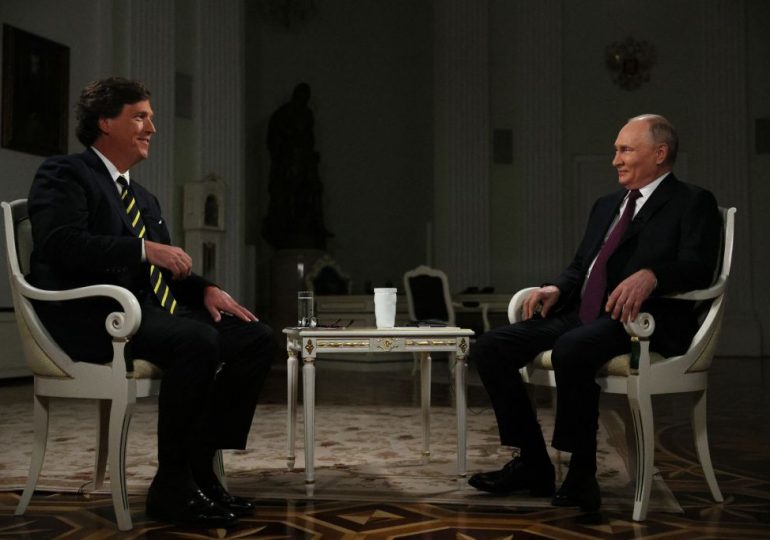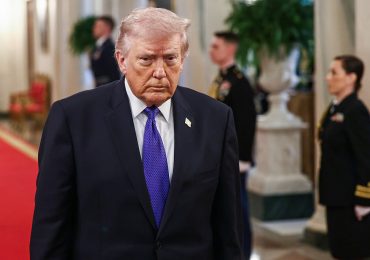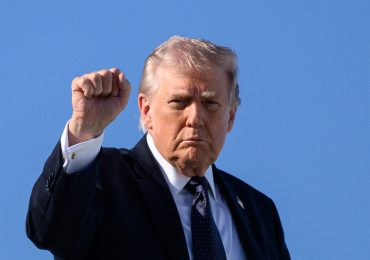Republican foreign policy hawks are going on the warpath. After Tucker Carlson recently traveled on his mission to Moscow to interview Russian president Vladimir Putin, former Republican congressman Adam Kinzinger called him a “traitor.” And after former president Donald Trump remained silent about the murder of Russian opposition leader Alexei Navalny, the presidential candidate and former South Carolina governor Nikki Haley told Fox News that “it’s amazing…how weak in the knees he is when it comes to Putin.”
[time-brightcove not-tgx=”true”]
Actually, it isn’t. An infatuation with foreign dictators has formed a durable strand of the conservative movement, one dating back over a century. Again and again, many on the right, much like the far left fellow-travelers who worshipped despots such as Joseph Stalin or Fidel Castro, have latched upon foreign authoritarians as models for how to reshape American society domestically. The result has not simply been neutrality toward but outright admiration for some of the worst tyrants in modern history, including Benito Mussolini, Adolf Hitler, Francisco Franco, and Augusto Pinochet.
This veneration has its sources in World War I, when leading figures on the right such as the well-known journalist H.L. Mencken and the publicist George Sylvester Viereck championed the cause of illiberal imperial Germany, denounced democratic Great Britain and opposed American entry into the conflict. Mencken viewed liberal democracy as tantamount to mob rule and later backed what he called an “intelligent fascism.” Mencken pioneered many of the arguments that the right would use in coming decades. He argued that President Woodrow Wilson and globalists were conspiring to creating a deep state that would mire America in a senseless conflict. After visiting Germany in 1917, he declared in the Atlantic that General Erich von Ludendorff, who would march with Hitler in the abortive 1923 Beer Hall putsch, was the country’s “national messiah.”
After World War I ended, the right fomented numerous revisionist works about the war that blamed America for it. The prominent conservative Albert Jay Nock, for example, published a book about Germany with a title that said it all: The Myth of a Guilty Nation. This revisionism helped set the stage in September 1940 for the establishment of the America First movement, which had 800,000 members and was championed by the famed former aviator Charles Lindbergh. Lindbergh and others didn’t simply support isolationist policies but were actively sympathetic toward Nazi Germany which they viewed as a vital ally in the struggle against Stalin’s Soviet Union. They wanted America to align itself with fascism. Indeed, in an incendiary speech called “Who Are the War Agitators” in Des Moines, Iowa in September 1941, Lindbergh created a national furor by declaring that “the three most important groups who have been pressing this country toward war are the British, the Jewish and the Roosevelt administration.”
The Nazi government directly enmeshed itself in American politics, using American agents such as George Sylvester Viereck to influence Congress. Senators such as Ernest Lundeen pleaded the Nazi case and Viereck was eventually imprisoned for traitorous activities. Others confined their efforts to pushing the German cause in speeches and pamphlets. The Chicago activist Elizabeth Dilling, who was known as the “Female Fuhrer” in Germany, lauded Hitler as restoring order. Others on the right such as the anti-Semitic Father Coughlin, who was the host of a popular weekly radio show, hailed Spain’s Francisco Franco as a defender of western Christendom. And the reactionary New York businessman Merwin K. Hart, a former classmate of Franklin Roosevelt’s at Harvard, announced in a speech at the Union League Club in New York that it was “time to brush aside this word `democracy’”—drawing a public rebuke from Franklin Roosevelt’s Attorney General Robert Jackson.
After World War II, the anti-interventionist right was largely discredited but dictators remained an object of perennial fascination. Take William F. Buckley, Jr. This conservative icon and his brethren at National Review praised the apartheid system in South Africa as well as the brutal regime of Chile’s Pinochet. After traveling to Chile on a junket, Buckley lauded Pinochet as “big-chested, penetrating eyes, the faint glimmer of suspicion there…regal, is another way to put it.”
Then there was Patrick J. Buchanan, a veteran of the Nixon administration and fiery opponent of globalism. Pitchfork Pat, as he was known, campaigned twice for the Republican nomination for the presidency in 1992 and 1996 and won a nationwide following for his unvarnished anti-Washington message. Buchanan opposed entry into World War I and World War II as well as free trade and immigration. He also was regularly accused of antisemitism, defended apartheid South Africa and the southern confederacy, and wrote a syndicated column in 1977 that referred to Hitler as “a soldier’s soldier.”
After the Cold War ended, Buchanan became the chief promoter of Putin’s Russia as a bastion of manly Christian values and hostility to gay rights. In 2013, he asked whether Putin was “one of us?” A year later, Putin invaded Crimea and former New York city mayor Rudy Giuliani contrasted him favorably with President Barack Obama—“that’s what you call a leader.” Buchanan, too, was impressed. In 2017, he declared, “Putin puts Russia first.”
What once seemed like a radical stance has now become the new normal in the GOP. A number of Republican legislators fell over themselves to praise Carlson’s fawning interview with Putin. Rep. Clay Higgins gushed that Putin is a “studied man of resolute spirit.” Senator Tommy Tuberville declared that Putin is “on the top of his game” and appeared to be ready for peace in Ukraine, unlike the “warmongers” in Washington. What’s more, Trump refused to mention Navalny’s name before eventually likening himself to the murdered dissident leader, while House speaker Mike Johnson stymies vital financial and military aid to Ukraine, much as the America Firsters in the early 1940s claimed that Great Britain was bound to go down to defeat and that any aid was a waste of American resources. Finally, the revelation that Russian intelligence agents guided the main informant in the Hunter Biden case more than a little redolent of German spying and disinformation efforts before World War II.
None of this seems to unduly perturb the new Putin wing in the GOP, which represents what Rep. Matt Gaetz rightly calls a “generational shift in my party” from the establishment to a younger advance guard. Right now, Gaetz and his ideological comrades are in control—and they aren’t about to give it up any time soon. Maybe the surprising thing isn’t that the contemporary GOP is morphing into an ally of the likes of Hungarian prime minister Viktor Orban or Putin. It’s that it took this long to occur.
Leave a comment








